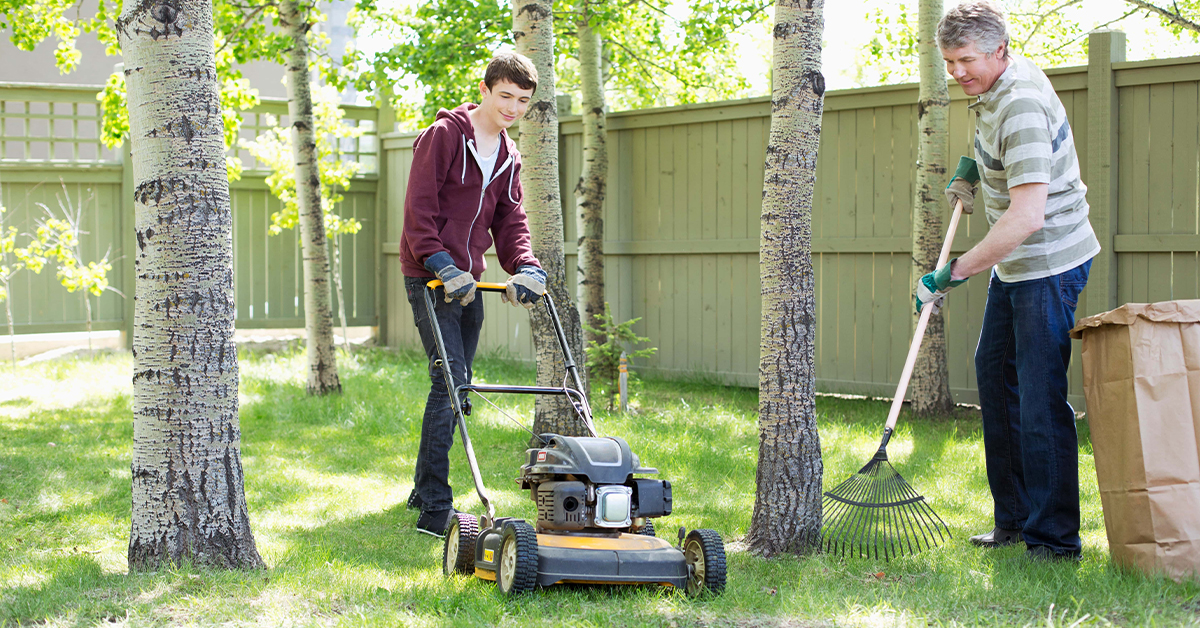6 Essential Life Skills for Teens to Learn Before Leaving the Nest

As you go through day-to-day life with your children, it can be strange to think that a time will come when they move out of your home and go off on their own. Maybe the thought of that day makes you sad, or you could be looking forward to it a bit. Either way, it’s an important reality to face and prepare for—especially if you have teenagers.
One of the main goals of parenthood is to raise children who become self-sufficient. The best way to achieve this is by explicitly teaching your children the skills they’ll need to live a successful, independent life. In this blog, we’re highlighting six essential life skills for teens and tips to teach them.
The Value of Teaching Life Skills
Going from living under your parent’s roof to living on your own can come with quite a bit of challenges. Oftentimes, young adults end up leaving the comfort of their parent’s home without the necessary knowledge and skills to take care of themselves well. This can cause them to develop feelings of stress and anxiety as they attempt to figure things out on the fly.
As a parent, you can’t assume that your child will gain life skills simply by watching you or another adult. If you want to prepare them for independent life, then you must be intentional about teaching them long before they’re ready to spread their wings.
Show them how to complete various tasks and explain the importance. Answer their questions thoughtfully, even if they seem like common sense to you. And of course, provide many opportunities to practice the skills you’ve taught them. This will help your teens grow in their independence and ensure they feel more confident when the day comes to leave home.
6 Major Life Skills for Teens

There are a lot of life skills for teens to learn before they go out into the real world. Here are six of the most important ones that you should teach your children while they’re still young.
1) Personal Finance
Knowing how to manage money wisely is arguably the most crucial life skill for teens to learn before they become fully independent. By taking the time to teach your teens financial discipline and responsibility, you’ll set them up to make responsible decisions in the future.
The most effective way to accomplish this is by giving them the freedom to manage their own money. As they gain money from allowances, chores, gifts, or even jobs, put them in charge of certain expenses like buying gas for the car or paying their cell phone bill. Help them set a budget, discuss spending habits, and open a savings account.
Of course, check in on a regular basis with your teen regarding their financial decision-making. We recommend that you discuss the following financial topics with your teens before they head off into the world:
- Banking
- Paying bills
- Writing checks and transferring money
- Preparing taxes
- How credit works
- Loans and interest
2) Meal Preparation and Cooking
Right now, your teens are likely used to you making sure that they’re well fed each day. They probably don’t have to worry about planning out meals for the week, grocery shopping, or preparing dinner for themselves. But what happens when they’re on their own and don’t even know how to boil water or preheat the oven?
You don’t want your young adult living off cereal and fast food, so be sure to teach them the following skills while they’re still under your supervision:
- How to read a recipe
- How to plan meals and shop for groceries affordably
- How to make a well-balanced, nutritious meal using simple ingredients
- How to use kitchen tools and appliances safely
- How to store food properly
- Emergency preparedness
An easy first step is to include your kids in the process. Ask them to help you come up with meal ideas, shop, cook, and clean up. Once they become more comfortable and knowledgeable, encourage them to make one meal for the family each week by themself. This is a great way to help them become more self-sufficient and contribute to the home.
3) Home Maintenance
Chores are one of the most common causes of arguments between roommates and spouses—particularly when someone isn’t pulling their weight. If your teen doesn’t know how to maintain a tidy living space, then they may be in for some heated moments and embarrassment in the future.
To avoid these confrontations, teach your kids how to maintain a clean home and what products/tools to use while they’re young. Just like cooking, involve them as much as possible while you’re cleaning up around the house. Start small with tasks like dusting and doing the dishes. Model each task, then let them try.
Once they’ve mastered a few tasks, assign daily chores that they’re responsible for. In time, introduce new tasks that require more effort, such as laundry, mopping, and yard work, and increase or adjust their chore list.
Aside from cleaning, be sure to also teach older teens basic maintenance skills like how to change air filters, test smoke detectors, do simple repairs and plumbing, and winterize the house. This will ensure that they’re prepared when they move into their own place.

4) Communication Skills
Communication is an essential skill for us all to master, as it has a major impact on how we form and maintain relationships with others. And although a vast amount of communication occurs digitally these days, it’s important that young adults learn to interact appropriately with others in person, on the phone, and through written correspondences.
The best way to teach your children good social skills is to model it for them. Then, provide them with opportunities to practice themselves. For example, teach the basics of phone call etiquette, model it, and then have your child make a call to set up an appointment or dinner reservation. Not only will this help them become a better communicator, but it will also increase their confidence and autonomy.
5) Time Management
When your teen becomes fully in charge of running their own schedule someday, they’ll be grateful that you taught them how to manage their time effectively.
Juggling school work, jobs, hobbies, relationships, and other responsibilities can be challenging. Encourage your kids to create a routine and use tools (like a physical planner or calendar app) to help them plan out their days. At first, they might need some guidance with prioritizing tasks, but they’ll eventually get a better sense of the order that things should be done.
Additionally, make sure you also discuss the importance of getting enough sleep and setting aside time to recharge.
6) Employment Skills
Finding and securing a job is often quite challenging when you go through the process for the first time—especially if you have the pressure of needing to provide for yourself financially. When your teen leaves home, you want them to have the skills needed to become employed. So, start teaching them job-hunting skills while they’re still under your roof, such as:
- Searching for job postings
- Creating a resume and cover letter
- Completing an application
- Preparing what to wear
- Conducting oneself during an interview
- Following up post-interview
- Accepting or rejecting a job offer
- Negotiating pay
Consider encouraging your teen to get a summer job or part-time work during weekends or after school. This will give them job experience and help contribute to money management lessons.

Of course, there are far more than six life skills for teens to learn before they embark on their adult lives, but we hope this list is a helpful starting point for you to begin preparing your kids for the future.
While teaching all these skills can seem overwhelming, don’t overthink it. When you’re going about your everyday tasks like cooking, cleaning, and going to the bank, call your kids over to show them the ropes. Then, provide them with opportunities to be more independent and involved in the running of your home. They might groan at first when you ask them to take on more responsibilities, but they’ll thank you someday. Trust us.